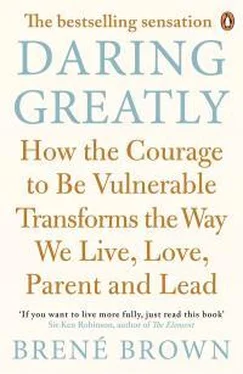It feels good to have an explanation, especially one that conveniently makes us feel better about ourselves and places the blame on those people . In fact, whenever I hear people making the narcissism argument, it’s normally served with a side of contempt, anger, and judgment. I’ll be honest, I even felt those emotions when I was writing that paragraph.
Our first inclination is to cure “the narcissists” by cutting them down to size. It doesn’t matter if I’m talking to teachers, parents, CEOs, or my neighbors, the response is the same: These egomaniacs need to know that they’re not special, they’re not that great, they’re not entitled to jack, and they need to get over themselves. No one cares. (This is the G-rated version.)
Here’s where it gets tricky. And frustrating. And maybe even a little heartbreaking. The topic of narcissism has penetrated the social consciousness enough that most people correctly associate it with a pattern of behaviors that include grandiosity, a pervasive need for admiration, and a lack of empathy. What almost no one understands is how every level of severity in this diagnosis is underpinned by shame. Which means we don’t “fix it” by cutting people down to size and reminding folks of their inadequacies and smallness. Shame is more likely to be the cause of these behaviors, not the cure.
LOOKING AT NARCISSISM THROUGH THE LENS OF VULNERABILITY
Diagnosing and labeling people whose struggles are more environmental or learned than genetic or organic is often far more detrimental to healing and change than it is helpful. And when we have an epidemic on our hands, unless we’re talking about something physically contagious, the cause is much more likely to be environmental than a hardwiring issue. Labeling the problem in a way that makes it about who people are rather than the choices they’re making lets all of us off the hook: Too bad. That’s who I am . I’m a huge believer in holding people accountable for their behaviors, so I’m not talking about “blaming the system” here. I’m talking about understanding the root cause so we can address the problems.
It’s often helpful to recognize patterns of behaviors and to understand what those patterns may indicate, but that’s far different from becoming defined by a diagnosis, which is something I believe, and that the research shows, often exacerbates shame and prevents people from seeking help.
We need to understand these trends and influences, but I find it far more helpful, and even transformative in many instances, to look at the patterns of behaviors through the lens of vulnerability. For example, when I look at narcissism through the vulnerability lens, I see the shame-based fear of being ordinary. I see the fear of never feeling extraordinary enough to be noticed, to be lovable, to belong, or to cultivate a sense of purpose. Sometimes the simple act of humanizing problems sheds an important light on them, a light that often goes out the minute a stigmatizing label is applied.
This new definition of narcissism offers clarity and it illuminates both the source of the problem and possible solutions. I can see exactly how and why more people are wrestling with how to believe they are enough. I see the cultural messaging everywhere that says that an ordinary life is a meaningless life . And I see how kids that grow up on a steady diet of reality television, celebrity culture, and unsupervised social media can absorb this messaging and develop a completely skewed sense of the world. I am only as good as the number of “likes” I get on Facebook or Instagram.
Because we are all vulnerable to the messaging that drives these behaviors, this new lens takes away the us-versus-those-damn-narcissists element. I know the yearning to believe that what I’m doing matters and how easy it is to confuse that with the drive to be extraordinary. I know how seductive it is to use the celebrity culture yardstick to measure the smallness of our lives. And I also understand how grandiosity, entitlement, and admiration-seeking feel like just the right balm to soothe the ache of being too ordinary and inadequate. Yes, these thoughts and behaviors ultimately cause more pain and lead to more disconnection, but when we’re hurting and when love and belonging are hanging in the balance, we reach for what we think will offer us the most protection.
There are certainly instances when a diagnosis might be necessary if we are to find the right treatment, but I can’t think of one example where we don’t benefit by also examining the struggle through the lens of vulnerability. Something can always be learned when we consider these questions:
What are the messages and expectations that define our culture and how does culture influence our behaviors?
How are our struggles and behaviors related to protecting ourselves?
How are our behaviors, thoughts, and emotions related to vulnerability and the need for a strong sense of worthiness?
If we go back to the earlier question of whether or not we’re surrounded by people with narcissistic personality disorder , my answer is no. There is a powerful cultural influence at play right now, and I think the fear of being ordinary is a part of it, but I also think it goes deeper than that. To find the source, we have to pan out past the name-calling and labeling.
We’ve had the vulnerability lens zoomed in here on a few specific behaviors, but if we pull out as wide as we can, the view changes. We don’t lose sight of the problems we’ve been discussing, but we see them as part of a larger landscape. This allows us to accurately identify the greatest cultural influence of our time—the environment that not only explains what everyone is calling a narcissism epidemic, but also provides a panoramic view of the thoughts, behaviors, and emotions that are slowly changing who we are and how we live, love, work, lead, parent, govern, teach, and connect with one another. This environment I’m talking about is our culture of scarcity.
SCARCITY: THE NEVER-ENOUGH PROBLEM
A critical aspect of my work is finding language that accurately represents the data and deeply resonates with participants. I know I’m off when people look as if they’re pretending to get it, or if they respond to my terms and definitions with “huh” or “sounds interesting.” Given the topics I study, I know that I’m onto something when folks look away, quickly cover their faces with their hands, or respond with “ouch,” “shut up,” or “get out of my head.” The last is normally how people respond when they hear or see the phrase: Never ________________ enough. It only takes a few seconds before people fill in the blanks with their own tapes:
Never good enough
Never perfect enough
Never thin enough
Never powerful enough
Never successful enough
Never smart enough
Never certain enough
Never safe enough
Never extraordinary enough
We get scarcity because we live it.
One of my very favorite writers on scarcity is global activist and fund-raiser Lynne Twist. In her book The Soul of Money , she refers to scarcity as “the great lie.” She writes:
For me, and for many of us, our first waking thought of the day is “I didn’t get enough sleep.” The next one is “I don’t have enough time.” Whether true or not, that thought of not enough occurs to us automatically before we even think to question or examine it. We spend most of the hours and the days of our lives hearing, explaining, complaining, or worrying about what we don’t have enough of. … Before we even sit up in bed, before our feet touch the floor, we’re already inadequate, already behind, already losing, already lacking something. And by the time we go to bed at night, our minds are racing with a litany of what we didn’t get, or didn’t get done, that day. We go to sleep burdened by those thoughts and wake up to that reverie of lack. … This internal condition of scarcity, this mind-set of scarcity, lives at the very heart of our jealousies, our greed, our prejudice, and our arguments with life. … (43–45).
Читать дальше






![Брене Браун - Вопреки. Как оставаться собой, когда всё против тебя [litres]](/books/436389/brene-braun-vopreki-kak-ostavatsya-soboj-kogda-v-thumb.webp)





